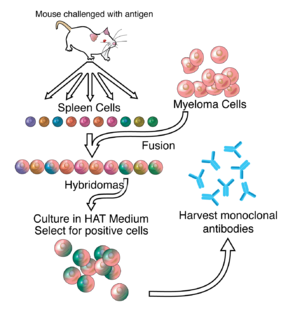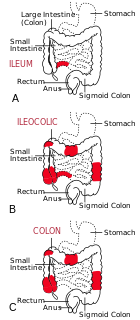Autoimmunity is the system of immune responses of an organism against its own healthy cells and tissues. Any disease that results from such an aberrant immune response is termed an "autoimmune disease". Prominent examples include celiac disease, diabetes mellitus type 1, sarcoidosis, systemic lupus erythematosus (SLE), Sjögren's syndrome, eosinophilic granulomatosis with polyangiitis, Hashimoto's thyroiditis, Graves' disease, idiopathic thrombocytopenic purpura, Addison's disease, rheumatoid arthritis (RA), ankylosing spondylitis, polymyositis (PM), dermatomyositis (DM) and multiple sclerosis (MS). Autoimmune diseases are very often treated with steroids.
Rheumatology is a branch of medicine devoted to the diagnosis and therapy of rheumatic diseases. Physicians who have undergone formal training in rheumatology are called rheumatologists. Rheumatologists deal mainly with immune-mediated disorders of the musculoskeletal system, soft tissues, autoimmune diseases, vasculitides, and heritable connective tissue disorders.

Immunosuppressive drugs or immunosuppressive agents or antirejection medications are drugs that inhibit or prevent activity of the immune system.

Infliximab is a chimeric monoclonal antibody biologic drug that works against tumor necrosis factor alpha (TNF-α) and is used to treat autoimmune diseases. Infliximab was approved by the U.S. Food and Drug Administration (FDA) for the treatment of Crohn's disease, ulcerative colitis, psoriasis, psoriatic arthritis, ankylosing spondylitis, and rheumatoid arthritis. It is used off-label outside its FDA approval for Behçet's disease and other conditions. Infliximab is administered by intravenous infusion, typically at six- to eight-week intervals. It cannot be given by mouth because the digestive system would destroy the drug.
Etanercept is a biopharmaceutical that treats autoimmune diseases by interfering with tumor necrosis factor by acting as a TNF inhibitor. It has U.S. F.D.A. approval to treat rheumatoid arthritis, juvenile idiopathic arthritis and psoriatic arthritis, plaque psoriasis and ankylosing spondylitis. TNF-alpha is the "master regulator" of the inflammatory (immune) response in many organ systems. Autoimmune diseases are caused by an overactive immune response. Etanercept has the potential to treat these diseases by inhibiting TNF-alpha.
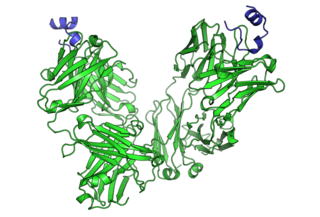
Cancer immunotherapy is the artificial stimulation of the immune system to treat cancer, improving on the system's natural ability to fight cancer. It is an application of the fundamental research of cancer immunology and a growing subspecialty of oncology. It exploits the fact that cancer cells often have tumor antigens, molecules on their surface that can be detected by the antibody proteins of the immune system, binding to them. The tumor antigens are often proteins or other macromolecules. Normal antibodies bind to external pathogens, but the modified immunotherapy antibodies bind to the tumor antigens marking and identifying the cancer cells for the immune system to inhibit or kill.

Adalimumab, sold under the trade name Humira among others, is a medication used to treat rheumatoid arthritis, psoriatic arthritis, ankylosing spondylitis, Crohn's disease, ulcerative colitis, chronic psoriasis, hidradenitis suppurativa, juvenile idiopathic arthritis, and uveitis. In rheumatoid arthritis, adalimumab has a response rate similar to methotrexate, and in combination, it nearly doubles the response rate of methotrexate alone.
A TNF inhibitor is a pharmaceutical drug that suppresses the physiologic response to tumor necrosis factor (TNF), which is part of the inflammatory response. TNF is involved in autoimmune and immune-mediated disorders such as rheumatoid arthritis, ankylosing spondylitis, inflammatory bowel disease, psoriasis, hidradenitis suppurativa and refractory asthma, so TNF inhibitors may be used in their treatment. The important side effects of TNF inhibitors include lymphomas, infections, congestive heart failure, demyelinating disease, a lupus-like syndrome, induction of auto-antibodies, injection site reactions, and systemic side effects.

Certolizumab pegol is a biologic medication for the treatment of Crohn's disease, rheumatoid arthritis, psoriatic arthritis and ankylosing spondylitis. It is a fragment of a monoclonal antibody specific to tumor necrosis factor alpha (TNF-α) and is manufactured by UCB.

Biological therapy, the use of medications called biopharmaceuticals or biologics that are tailored to specifically target an immune or genetic mediator of disease, plays a major role in the treatment of inflammatory bowel disease. Even for diseases of unknown cause, molecules that are involved in the disease process have been identified, and can be targeted for biological therapy. Many of these molecules, which are mainly cytokines, are directly involved in the immune system. Biological therapy has found a niche in the management of cancer, autoimmune diseases, and diseases of unknown cause that result in symptoms due to immune related mechanisms.
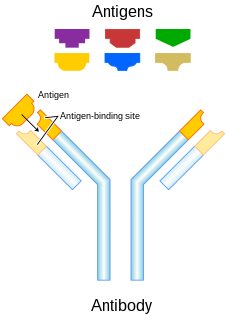
Monoclonal antibody therapy is a form of immunotherapy that uses monoclonal antibodies (mAb) to bind monospecifically to certain cells or proteins. The objective is that this treatment will stimulate the patient's immune system to attack those cells. Alternatively, in radioimmunotherapy a radioactive dose localizes a target cell line, delivering lethal chemical doses. More recently antibodies have been used to bind to molecules involved in T-cell regulation to remove inhibitory pathways that block T-cell responses. This is known as immune checkpoint therapy.
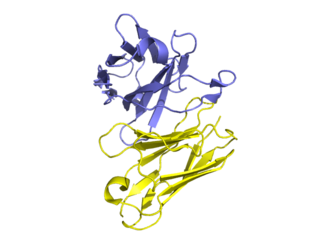
Golimumab is a human monoclonal antibody which is used as an immunosuppressive drug and marketed under the brand name Simponi. Golimumab targets tumor necrosis factor alpha (TNF-alpha), a pro-inflammatory molecule and hence is a TNF inhibitor. Profound reduction in C-reactive protein (CRP) levels, interleukin (IL)-6, intercellaular adhesion molecules (ICAM)-1, matrix metalloproteinase (MMP)-3, and vascular endothelial growth factor (VEGF) demonstrates golimumab as an effective modulator of inflammatory markers and bone metabolism.
Abatacept is a drug used to treat autoimmune diseases like rheumatoid arthritis, by interfering with the immune activity of T cells. It is a modified antibody.
Sir Marc Feldmann,, is an Australian immunologist, and a professor at the University of Oxford.
Mavrilimumab is a human monoclonal antibody that inhibits human granulocyte macrophage colony-stimulating factor receptor (GM-CSF-R).
Secukinumab, trade name Cosentyx, is a human IgG1κ monoclonal antibody that binds to the protein interleukin (IL)-17A, and is marketed by Novartis for the treatment of psoriasis, ankylosing spondylitis, and psoriatic arthritis.
Sarilumab is a human monoclonal antibody against the interleukin-6 receptor. Regeneron and Sanofi developed the drug for the treatment of rheumatoid arthritis (RA), for which it received US FDA approval on 22 May 2017 and European Medicines Agency approval on 23 June 2017.
Celltrion is a biopharmaceutical company headquartered in Incheon, South Korea. Celltrion Healthcare conducts worldwide marketing, sales, and distribution of biological medicines developed by Celltrion.
An immune checkpoint regulator is a modulator of the immune system, that allows initiation of a productive immune response and prevents the onset of autoimmunity. Examples of such a molecule are cytotoxic T-lymphocyte antigen 4, which is an inhibitory receptor found on immune cells and programmed cell death 1 (CD279), which has an important role in down-regulating the immune system by preventing the activation of T-cells.

MOR103 is a so-called fully human antibody which has been developed by the biotechnology company MorphoSys. It can also be referred to as HuCAL antibody, HuCAL standing for Human Combinatorial Antibody Library and being a technology used to generate monoclonal antibodies. MOR103 is directed against the granulocyte-macrophage colony stimulating factor (GM-CSF), a monomeric glycoprotein functioning as a cytokine promoting both proliferation and activation of macrophages and neutrophils.





